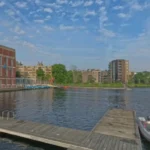Key Points
- A dead snake was discovered in Havering Country Park, causing public concern.
- The reptile has been officially identified as a species not native to the UK.
- Authorities have confirmed there is no imminent threat to residents or local wildlife.
- Expert examinations are ongoing; investigators are seeking to determine how the snake arrived in the park.
- Officials ask members of the public to remain calm but vigilant and report further sightings.
- The park has not been closed, but warning signs have been installed in key locations.
- Animal welfare groups are monitoring the situation and seeking information from the public regarding any lost exotic pets.
- The event has renewed debate on the regulation and monitoring of exotic pet ownership.
A dead snake, identified as a non-native species, has been discovered in Havering Country Park, east London, prompting a swift response from local authorities and animal welfare groups alike. The incident has stirred public interest and highlighted ongoing debates regarding clandestine exotic pet ownership in the UK.
- Key Points
- What Happened in Havering Country Park?
- Which Species Was the Dead Snake?
- How Did Authorities Respond to the Finding?
- Are There Risks to the Public or the Local Ecosystem?
- How Are Animal Welfare Groups and the Public Reacting?
- What Are the Broader Implications for Exotic Pet Ownership?
- What Guidance and Measures Are Now in Place?
- What Is the Status of the Investigation?
- What Are Experts Advising on Future Prevention?
What Happened in Havering Country Park?
As reported by the Havering Council press office, a park visitor discovered the lifeless snake late on Monday afternoon at a popular walking trail within Havering Country Park. The individual, preferring anonymity, photographed the unusual find and alerted the Havering Park Rangers, who responded immediately. On arrival, rangers safely retrieved the animal and cordoned off the immediate area for further inspection.
“While we often encounter wildlife in the park, this particular snake was immediately identified as something we do not usually see,”
a Havering Council spokesperson told local media.
Which Species Was the Dead Snake?
According to Dr. Emily Brooks, a reptile specialist consulted by the BBC, initial visual assessment suggested that the snake was
“certainly not a native UK species, such as a grass snake (Natrix helvetica) or adder (Vipera berus).”
Dr. Brooks clarified:
“The bright colour and distinctive patterning resembles that of some pythons or boas typically kept as exotic pets, though lab analysis will confirm the exact species.”
Animal welfare charity RSPCA, in a statement to ITV News, emphasised:
“Exotic snake species can sometimes be abandoned or escape from captivity. This occurrence underscores the need for responsible pet ownership and the importance of secure enclosures for such animals.”
How Did Authorities Respond to the Finding?
As reported by Tom Jenkins of The Guardian, the Havering Council implemented immediate precautionary measures — including the installation of warning signs around the park’s entrances and along key walking routes.
“Although we do not believe there is any risk to the public at this time, we urge anyone sighting unusual wildlife to contact the council or police,”
Council leader Linda van der Meer stated.
The Metropolitan Police’s wildlife crime unit has opened an enquiry into how the non-native snake came to be in Havering Country Park.
“We will be reviewing CCTV footage and interviewing witnesses. Any evidence of exotic pet abandonment will be investigated as a criminal matter,”
a police spokesperson told the Evening Standard.
Are There Risks to the Public or the Local Ecosystem?
Claire Armstrong of the BBC reported, based on interviews with zoologists, that
“the snake likely died within the last 48 hours and showed no signs of causing harm to park users or local animals.”
Dr. Martina Cobb, an ecologist consulted by The Times, said:
“A solitary dead snake, particularly a tropical species, poses little or no threat to the well-established British wildlife or human visitors.”
Nevertheless, RSPCA’s statement flagged the broader risks:
“Escaped or abandoned exotic pets can survive in UK environments only for a short time, but there is always potential risk if non-native species establish breeding populations.”
How Are Animal Welfare Groups and the Public Reacting?
Animal welfare groups have responded proactively, with a spokesperson for the RSPCA telling the Daily Mail:
“We would ask anyone with knowledge of a missing or abandoned pet to come forward confidentially. We’re working closely with local authorities to ensure animal welfare standards are maintained.”
Members of the local community have expressed a mixture of curiosity and concern.
“It’s not something you expect when walking your dog,”
said Amy Richardson, a frequent park user, to The Independent.
“But the council’s quick action has reassured us.”
What Are the Broader Implications for Exotic Pet Ownership?
As highlighted in an analysis by Dan Houghton of The Telegraph, the discovery has reignited public debate surrounding the regulation of exotic pets. Parliamentary discussions are ongoing about stricter licensing and registration requirements for owners of reptiles and other non-native species.
A spokesperson from the British Veterinary Association told Sky News:
“Proper education of exotic pet owners, as well as regular inspections, are vital to preventing incidents like this. Irresponsible ownership or abandonment of non-native animals can have severe consequences — both for the animals involved and the wider ecosystem.”
What Guidance and Measures Are Now in Place?
Havering Council and animal welfare officials have provided the following guidance:
- Members of the public are advised not to touch or attempt to capture any snakes or unusual wildlife.
- All sightings should be reported to park rangers, the council, or police.
- Animal welfare organisations can provide advice for those finding themselves with unwanted exotic pets.
Warning signs remain installed in the park, and local officials state there are no plans to restrict access but will “continue to assess the situation daily.”
What Is the Status of the Investigation?
As published by the Evening Standard, no individuals have yet claimed responsibility for the snake, and authorities are pursuing several lines of enquiry. The Metropolitan Police wildlife crime unit and DEFRA (Department for Environment, Food & Rural Affairs) are collaborating on tracing the snake’s origins.
Councillor Linda van der Meer assured the public:
“We are committed to fully investigating this matter, and we will take action if any breaches of animal welfare or wildlife laws are discovered.”
She urged the community to remain vigilant but calm:
“There is no current evidence of other non-native animals in the park, but we are taking every precaution.”
What Are Experts Advising on Future Prevention?
Animal welfare groups and experts are calling for renewed focus on legislation and public education. Dr. Brooks, as cited by the BBC, recommends:
“Stringent checks on exotic pet retailers and comprehensive owner training could help mitigate such incidents in the future.”
RSPCA officials advocate for the creation of a local exotic pet register, making it easier to investigate escapes or abandonment and locate owners swiftly.



